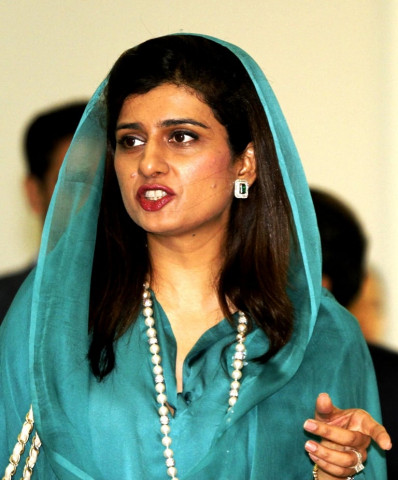Pakistan supports application of human rights: Khar
Pakistani Foreign Minister presents report during the second round of HRC Universal Periodic Review.

In the second round of UPR, Khar presented Pakistan’s national report on promotion and protection to the Human Rights Council. Khar mentioned that Pakistan was committed to combating terrorist. However, she termed drone attacks to be counterproductive and against the sovereignty of the country.
Pakistan’s foreign minister understated the government’s effort in improving the human rights conditions in Pakistan, adding that establishing National Commission on Human Rights and passing bills for women and children rights was a remarkable move made by the government.
According to a press release, a few countries including India, UK, Brazil, Indonesia and South Africa have already presented their Human Rights reports. Other countries including Pakistan, Sri Lanka, Japan and Switzerland presented their reports to the Human Rights Council during the current session.
The delegation sent to Geneva included Advisor to Prime Minister on Human Rights Mustafa Nawaz Khokhar, Advisor to Prime Minster on National Harmony Dr Paul Bhatti, Chairman, National Assembly Standing Committee on Human Rights Riaz Fatyana, and Member of the National Assembly Dr Araish Kumar.
Earlier this year, the Human Rights Watch had issued a report terming the past year ‘disastrous’ for the country. The report stated that the there were increasing militant attacks on civilians and inflation was on the rise. Minorities on the other hand faced security issues.
It also mentioned the problems the country faced after experiencing floods for the second year in a row.
Text of Khar's speech can be found here.
Western countries reject Pakistan’s claim
Western countries and the normally anti-Western Belarus countered that in Pakistan religious minorities were persecuted, that dissent was often brutally suppressed by the army, and that little was done to tackle human trafficking.
The Pakistan review, its second since the council was set up in 2006, comes at a time when it has been under global scrutiny following the shooting by Islamic radicals of a girl educational activist and riots against Christians.
It also comes just two weeks before it hopes to be appointed as a candidate of Asian countries to full membership of the council, where it is already active as the official voice of the 56-nation Organisation of Islamic Cooperation.
Some Western countries have already indicated they do not see Pakistan as a suitable candidate - although they accept there is little they can do to head off a clear majority vote for it in the UN General Assembly on November 12.
Serious concerns
"We have serious concerns about the human rights situation in Pakistan," US ambassador Eileen Donahoe told the council on Tuesday, referring to army operations "aimed at silencing dissent" in the rebellious province of Balochistan.
She said Pakistan should ensure that those guilty of torture, enforced disappearances and extrajudicial killings there must be prosecuted, while laws often used to justify discrimination against religious minorities should be reformed.
These remarks were directed at the country's "blasphemy" law, which provides for a range of harsh penalties up to execution for any act deemed to offend against Islam, and especially its Prophet Mohammed.
A British delegate told the council that the recent case of a young Christian girl accused by an imam of burning pages of the Koran showed the danger of the law for ordinary Pakistanis, including Muslims outside the Sunni majority.
"Credible elections in Pakistan will require that the rights of women are protected and political participation is ensured," said the delegate, Phil Tissot. Minorities should also be allowed to vote freely, he added.
The US and British strictures were echoed by Sweden Switzerland and a range of other European countries. And Belarus, which normally lines up with developing countries in UN bodies, took an even tougher line.



1725254039-0/Untitled-design-(24)1725254039-0-208x130.webp)















COMMENTS
Comments are moderated and generally will be posted if they are on-topic and not abusive.
For more information, please see our Comments FAQ